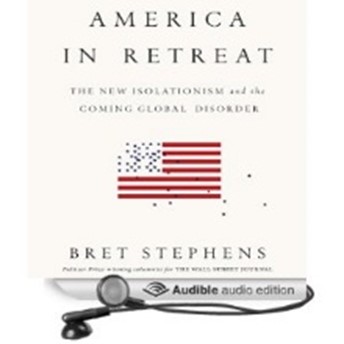 America In Retreat is written by Bret Stephens. It’s a great companion to The Accidental Superpower by Peter Zeihan.
America In Retreat is written by Bret Stephens. It’s a great companion to The Accidental Superpower by Peter Zeihan.
Both foresee world chaos but Stephens lays more blame on American isolationists in both parties, while Zeihan has a more optimistic view of the US bathed in shale oil.
I am contemplating a radio show on both these books soon, so stay tuned.
Who should read America In Retreat?
- Die-hard isolationists on the left and the right: Stephens argues that past US isolationism has had ugly aftermaths we shouldn’t forget.
- Moderates who can’t decide: Because if the cycle of chaos with ISIS and Russia continues, Stephens suggestions will make more sense to Americans who will have a knee-jerk reaction that will change from sit back and wait.
- Screenwriters: Stephens lays out his future scenario that has all the drama of an episode of Homeland.
Here are my key points:
Stevens lays out the current and upcoming chaos in world politics that is frightening. It’s hard to deny his theory: a US retreat does not make the world safer for anyone. He also seems to call for more military preparedness so we stop problems first rather than react to them after death and destruction have happened.
Historically, when we have become isolationist we usually pivot and years later become invasive or militaristic. Stephens points to World War I, World War II, and the 1990s before 9/11. However, he fails to address the theory that these enemies – namely Russia and ISIS now — could be baiting us so we start spending and wasting our wealth and riches.
Use your filters reading American In Retreat. Stephens’ main gig is writing for the editorial board of Wall Street Journal – which leans hard right especially on military issues. The book is clearly anti-isolationist, anti-Obama, and anti-Rand Paul.
Stevens also plays with facts. For instance, he says that the Obama stimulus was bigger than the money spent on the Iraq and Afghanistan wars. First, the stimulus wasn’t entirely under Obama. Secondly, the amount of money spent on both the stimulus and the war effort is ongoing.
He also makes sweeping statements that miss the mark. He says isolationists are people who believe the United States is in the decline. Actually, I think most people see the US as holding its own – especially thanks to the shale oil boom – and compared to the rest of the world.
Stephens delivers his message like a Dick Cheney Republican while chiding George W. Bush for bungling Iraq – which seems like typical GOP post-Iraq talking points. Stephens calls for more military spending and for increased military alliances with allies and no decrease to the US military as the world cop. He calls for smarter technology that can be built on and adapted so US military personnel can be quickly dropped into hot spots. Yet he rarely discusses the upcoming Medicare financial tsunami that we face or its budget consequences.
Stephens admits that anyone predicting the future is usually wrong. Still, he unveils a flash forward scenario with Hillary Clinton as President in 2017. And, in Stephens’ view, it is an unmitigated disaster. It looks like World War III with North Korea, Saudi Arabia, Pakistan, Iran, China, Japan, and a whole host of others in a number of skirmishes that leaves President Hillary wondering why she even wanted the job.
His future shock is worth the read for his insight and creativity. Although any observer of world politics and economics would realize no matter who is President these predictions would still be viable.
The book will leave you asking yourself: is Stephens alarmist or clairvoyant? Only the near future will tell.
Comments on this entry are closed.